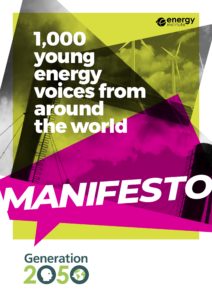 A 1000-strong body of young people coming up through the ranks in global energy sector have today sent an unambiguous message to leaders in their own industry and governments that action on climate change and extending universal access to energy is neither fast nor ambitious enough.
A 1000-strong body of young people coming up through the ranks in global energy sector have today sent an unambiguous message to leaders in their own industry and governments that action on climate change and extending universal access to energy is neither fast nor ambitious enough.
The warnings come in a Manifesto published by Generation 2050, the initiative from the Energy Institute (EI), supported by high-profile partners across the world of energy, who share the view that tomorrow’s energy leaders should be heard today.
With less than a year until COP26, it articulates the views of young people working in or studying every aspect of energy – from oil and gas through to nuclear, renewables and energy efficiency, from London to Lagos, Singapore to San Francisco.
Sinead Obeng AMEI, chair of the EI’s Young Professionals Council, said, “Climate change is an intergenerational emergency compounded by the need to meet growing global energy demand, particularly for the millions still living without adequate access to energy.
“Young professionals in energy today will be the industry’s leaders in 2050. We will inherit a sector that will be judged on how it has responded. As we approach critical decisions in the lead up to COP26 and for the recovery from the global pandemic, there hasn’t been a more important time for the voices of Generation 2050 to be heard.”
Responding to the Manifesto, EI president Steve Holliday FREng FEI said, “The global energy industry has tremendous achievement to its name. But the next decade will be defining for the sector – to deliver the UN’s universal energy access goal, and to accelerate progress to achieve global net zero emissions.
“This Manifesto is a fresh wake up call. It exposes the do-or-die conundrum facing many traditional energy companies. They will only attract the talent they need if they are responsive – and I mean with concrete actions – to the environmental and social demands of Generation 2050.”
Headline findings:
- Generation 2050 are highly motivated: Tackling climate change is the reason for choosing a career in energy according to almost 60% of Generation 2050. Almost 90% believe their career gives them greater agency to tackle this global challenge.
- Action on climate change must be redoubled: Three quarters fear the world will currently not limit global average temperature rise to 2C this century. Political leaders should introduce legislative and regulatory reforms to drive the transition further and faster; industry leaders should align their business plans and commitments with global climate targets.
- More must be done to extend access to energy: Three quarters of Generation 2050 believe the UN goal of achieving universal access to energy by 2030 is currently out of reach. Political leaders should support international projects and cooperate with each other; industry leaders should invest in the necessary technology and infrastructure and support for social enterprises.
- Each and every one of us has a responsibility: In an appeal to the behaviours and choices we all make in our lives, Generation 2050 rank educating ourselves, voting for leaders who prioritise climate action and changing our consumption habits as the priority actions.
- Visionary leadership will be required: These global challenges will put a premium on future leaders with vision, the ability to deliver, communication and change management skills and broad knowledge of the wider world. Generation 2050 urge today’s leaders to work individually and collectively to bring on the skills that will be required by those that succeed them.



